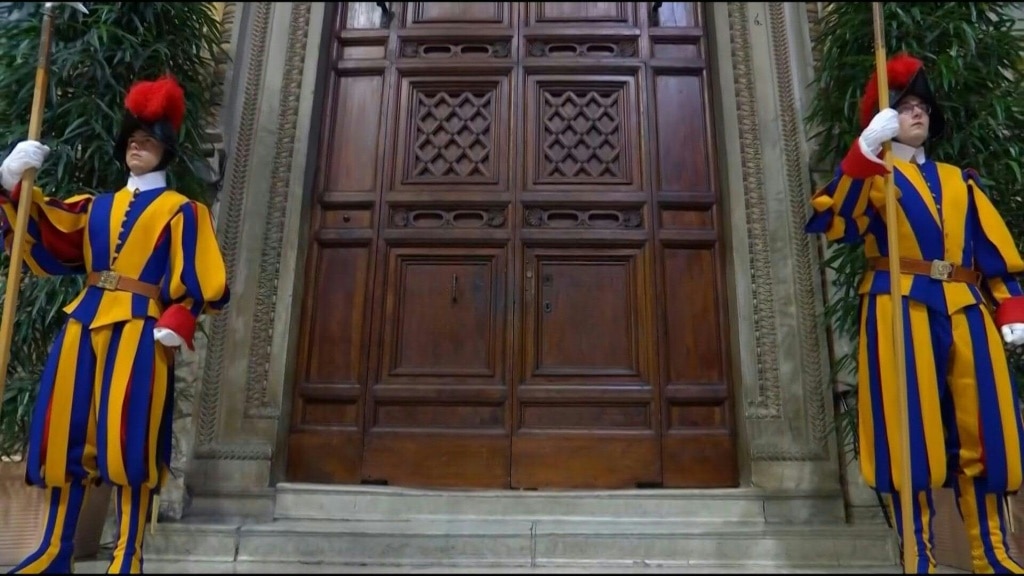Smoke rises: First results for pope vote
Smoke has risen from the Vatican after the 133 cardinals took part in their first vote for a new pope.
Black smoke has risen from the ceiling of the Sistine Chapel in the Vatican.
At around 9pm on Wednesday, Rome time, (5am Thursday, AEST) the whisps emerged from a chimney.
The black smoke means while a vote on a new pope has taken place among cardinals, no candidate has yet reached a majority.
Further votes will take place to try and reach a majority. When white smoke emerges that will be the sign a new pope has been chosen.
Earlier, the cardinals responsible for choosing the future pope held one final mass in St Peter’s Basilica in the Vatican on Wednesday before sealing themselves away to elect the new head of the Catholic Church.

A total of 133 cardinals from five continents are sequestered inside the Vatican as they prepare to take part in the conclave, the top secret voting process to select a successor to Pope Francis, who died last month after a 12-year papacy.
Among them will be Australia’s representative, Ukrainian-born cardinal Mykola Bychok, who is based in Melbourne and is the youngest member of the Sacred College of Cardinals at 45.
The pre-conclave mass, which is the last publicly celebrated rite before the secret election process begins, was led by dean of the College of Cardinals, Giovanni Battista Re, who used his homily to urge his fellow cardinals to select a pope “whom the church and humanity need at this difficult, complex and tormented turning point in history.”


He also said that they should look to “maintain the unity of the church,” although a “unity that does not mean uniformity, but a firm and profound communion in diversity, provided that full fidelity to the Gospel is maintained”.
In a time of geopolitical uncertainty, the new pope faces diplomatic balancing acts, as well as Church infighting, the continued fallout from the clerical child abuse scandal, and – in the West – increasingly empty pews.
No clear frontrunner has emerged from among the prelates – who represents a range of progressive and conservative traditions within the Church – and the contest to lead the 2000-year-old institution appears wide open.
With clerics from around 70 countries, this conclave is the largest ever, and the next pontiff will have to secure at least 89 votes, a two-thirds majority.
At 91-year-old, Cardinal Re is not eligible to vote in the conclave as the cut-off age is 80.


The cardinals are staying at the Vatican’s Santa Marta guesthouse, where Francis used to live, and Santa Marta Vecchia, a building next door usually housing Vatican officials.
As part of the process, the cardinals must surrender their mobile phones and airwaves around the Vatican are jammed to block communication from the outside world.
At 3.45pm on Wednesday (11.45pm AEST) they set off from Santa Marta to gather at the Pauline Chapel of the Apostolic Palace, where a prayer was held.
They then proceeded into the 15th-century Sistine Chapel for the conclave, which is “one of the most secret and mysterious events in the world”, the Vatican said on Tuesday.
The cardinals are expected to be locked away for several days as they deliberate. Both Francis and his predecessor Benedict XVI were elected within two days, but the longest papal election in Church history lasted 1006 days, from 1268 to 1271.

What will happen inside the conclave
Under a ceiling of frescoes painted by Michelangelo, Italian Cardinal Pietro Parolin – the senior elector – will call on God to give the cardinals “the spirit of intelligence, truth and peace” needed for their task.
Parolin, a frontrunner who was Francis’s number two as secretary of state, will then lead the cardinals in chanting the Latin invocation of the Holy Spirit: “Veni, Creator Spiritus”.
The cardinals have spent days discussing the most pressing challenges facing the Catholic Church and the character traits its new leader needs.
Burning issues include falling priest numbers, the role of women, the Vatican’s troubled balance sheets and how to adapt the Church to the modern world.
Some 80 per cent of the cardinals were appointed by Francis, an impulsive, charismatic champion of the downtrodden.
But while interviews in the run-up suggested that some cardinals favour a leader able to protect and develop his legacy, others want a more conservative defender of doctrine.
More than a dozen names are circulating, from Italian Pierbattista Pizzaballa to Hungary’s Peter Erdo and Sri Lanka’s Malcolm Ranjith.
We may never know how close a race it is. Having surrendered mobile phones, the red-robed cardinals will swear an oath to keep the conclave’s secrets.
They also each pledge to “faithfully” serve as pope should they be chosen, before the master of liturgical ceremonies says “Extra ones” ("Everyone out”).
Once the doors close, the cardinals fill out ballots marked “Eligo in Summum Pontificem” ("I elect as Supreme Pontiff”).
They then carry them, folded, and place them on a silver plate which is used to tip them into an urn, set on a table in front of Michelangelo’s Last Judgement.
More Coverage
The cardinals traditionally cast just one ballot on the first evening, burning the votes along with a chemical that produces black smoke if there is no decision, white for a new pope.
Outside, hundreds of the faithful have gathered on St Peter’s Square, all eyes trained on the Sistine Chapel chimney.
—With AFP





